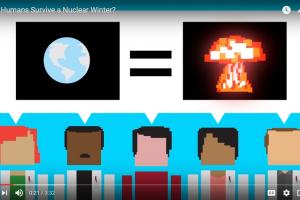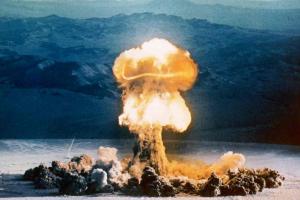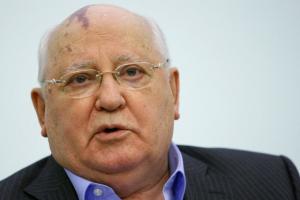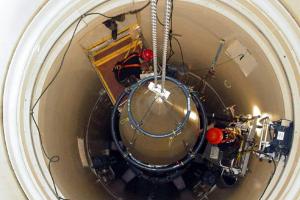8 in 10 Americans Fear Nuclear War as Trump Says US 'Locked and Loaded'
Common Dreams
 The research predicts that a nuclear war fought between emerging nuclear weapon states—with less than 1 percent of the explosive power contained in the global nuclear arsenals—can produce catastrophic long-term damage to global environment and weather. A war fought with 100 atomic bombs can result in the coldest average annual surface temperatures experienced in the last 1,000 years, and this prolonged cold (and drought) would last for several years.
The research predicts that a nuclear war fought between emerging nuclear weapon states—with less than 1 percent of the explosive power contained in the global nuclear arsenals—can produce catastrophic long-term damage to global environment and weather. A war fought with 100 atomic bombs can result in the coldest average annual surface temperatures experienced in the last 1,000 years, and this prolonged cold (and drought) would last for several years.
 As Trump faces down North Korea, it’s alarming to think that most of the world’s nuclear warheads are now in the hands of men who are prepared to use them. We do know that Donald Trump has been obsessed since the 80s with nuclear weapons, that he refuses to take advice from military professionals and that he seems not to understand the core NATO concept of nukes as a political deterrent, as opposed to a military super weapon.
As Trump faces down North Korea, it’s alarming to think that most of the world’s nuclear warheads are now in the hands of men who are prepared to use them. We do know that Donald Trump has been obsessed since the 80s with nuclear weapons, that he refuses to take advice from military professionals and that he seems not to understand the core NATO concept of nukes as a political deterrent, as opposed to a military super weapon.
 Ultimately the only long-term solution to the problem of national leaders launching a nuclear war is to get rid of the weapons. This was the justification for the nuclear Non-proliferation Treaty (NPT) of 1968, which constituted a bargain between two groups of nations. Under its provisions, non-nuclear countries agreed not to develop nuclear weapons, while nuclear-armed countries agreed to dispose of theirs.
Ultimately the only long-term solution to the problem of national leaders launching a nuclear war is to get rid of the weapons. This was the justification for the nuclear Non-proliferation Treaty (NPT) of 1968, which constituted a bargain between two groups of nations. Under its provisions, non-nuclear countries agreed not to develop nuclear weapons, while nuclear-armed countries agreed to dispose of theirs.
 The world today is overwhelmed with problems. Policymakers seem to be confused and at a loss. But no problem is more urgent today than the militarization of politics and the new arms race. Stopping and reversing this ruinous race must be our top priority. While state budgets are struggling to fund people's essential social needs, military spending is growing.
The world today is overwhelmed with problems. Policymakers seem to be confused and at a loss. But no problem is more urgent today than the militarization of politics and the new arms race. Stopping and reversing this ruinous race must be our top priority. While state budgets are struggling to fund people's essential social needs, military spending is growing.
 Reader Comments: Global Nuclear War Danger - Avoiding the Unthinkable; Hillary Clinton and Working Class Voters; Art as Politics: Star Wars New Movie; What Now for the Left; Viewers debate the Russian-Election Frenzy; Brazil; W.E.B. DuBois and the Working Class; Student Digital Literacy and Technology; Butter - Good for You?; #NoDAPL December Month of Actions; Responsible and Ethical Cuba Travel; Special - Holiday Book Offers; and more ...
Reader Comments: Global Nuclear War Danger - Avoiding the Unthinkable; Hillary Clinton and Working Class Voters; Art as Politics: Star Wars New Movie; What Now for the Left; Viewers debate the Russian-Election Frenzy; Brazil; W.E.B. DuBois and the Working Class; Student Digital Literacy and Technology; Butter - Good for You?; #NoDAPL December Month of Actions; Responsible and Ethical Cuba Travel; Special - Holiday Book Offers; and more ...
 The single most dangerous spot on the globe, the current situation in Kashmir cannot continue. The Kashmiris should have their referendum — and both India and Pakistan will have to accept the results. The world cannot afford the current tensions to spiral down into a military confrontation that could easily get out of hand. Neither country would survive a nuclear war, and neither country should be spending its money on an arms race.
The single most dangerous spot on the globe, the current situation in Kashmir cannot continue. The Kashmiris should have their referendum — and both India and Pakistan will have to accept the results. The world cannot afford the current tensions to spiral down into a military confrontation that could easily get out of hand. Neither country would survive a nuclear war, and neither country should be spending its money on an arms race.
 Mikhail Gorbachev, the last Soviet leader, called for peace and a de-escalation in tensions between the US and Russia. What is the future for dialogue between the two countries under current circumstances? Gorbachev spoke in Reykjavik on Monday, calling for increased dialogue between the US and Russia
Mikhail Gorbachev, the last Soviet leader, called for peace and a de-escalation in tensions between the US and Russia. What is the future for dialogue between the two countries under current circumstances? Gorbachev spoke in Reykjavik on Monday, calling for increased dialogue between the US and Russia
 Astounding increases in the danger of nuclear weapons have paralleled provocative foreign policy decisions that needlessly incite tensions between Washington and Moscow. It's been 71 years since atomic bombs destroyed Hiroshima and Nagasaki, and humanity's memory of those events has dimmed. The bombs that obliterated those cities were tiny by today's standards.
Astounding increases in the danger of nuclear weapons have paralleled provocative foreign policy decisions that needlessly incite tensions between Washington and Moscow. It's been 71 years since atomic bombs destroyed Hiroshima and Nagasaki, and humanity's memory of those events has dimmed. The bombs that obliterated those cities were tiny by today's standards.
Spread the word